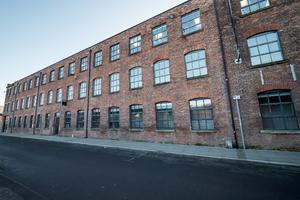How Coworking Can Help Your Business in 2023

10 January 2023
We speak with Rebecca Mckeown & Joe Averill about the challenges and demands businesses face this year and how flexible workspace can help them.
How Coworking can help your business in 2023
From Manchester to London and beyond, coworking spaces have become a staple in the 21st century for businesses of all sizes. The need for flexible workspace solutions has never been higher, and as we head into a brand new year, there is no sign of that changing.
2023 will present new challenges to the business world, with many businesses seeking to take advantage of the flexible workspace, shared facilities, and premium amenities found in coworking spaces as a way to combat rising costs and an unpredictable global climate. Last year the demand for flexible workspace grew by 22% as many businesses pivot to hybrid working.

Coworking Space at Colony One Silk St, Manchester
With the high demand comes a wide range of coworking providers, each with their own unique features and benefits. It feels like there has never been this much choice available to businesses looking for flexible, shared workspace.
But how can coworking providers help your business flourish? What should you look for to ensure you are getting the most out of your coworking space? We spoke with Rebecca McKeown, Operations Director here at Colony and Joe Averill, Founder of Level Workspace, to examine the ways coworking spaces can help your business in a big way in 2023.

As our Operations Director, Rebecca McKeown has been instrumental in supporting businesses using Colony’s coworking memberships & private offices. We wanted to get her perspective on the benefits of coworking in 2023.
What are the top benefits that businesses can expect to receive when choosing to work in a coworking space in 2023?
We are seeing more and more businesses make the jump to a coworking model in Manchester. A lot of the reasons behind that come from a need for flexibility, community and access to premium facilities.
In 2023 businesses need to be able to adapt to an unpredictable world. Coworking spaces, like Colony, can help by offering more flexible arrangements than traditional offices. You could take a bank of 4 desks for your team of 8 and have them used on rotation for example.
Community is also a big benefit of coworking spaces. Having access to a like-minded network for advice, collaboration and support is so key to progressing your business in 2023. We have been amazed to see some of the long standing business relationships that have developed in our venues, and the social connections too!
How has the coworking industry evolved in the last few years and how does this benefit businesses in terms of cost and flexibility?
Post-pandemic, the coworking industry has really come into its own. We are providing a workspace solution that makes sense and is incredibly useful to businesses in the new world. With the increase in demand we have also seen a shift towards more flexible, hybrid memberships & leases. At the same time people still expect all the premium facilities, perks and benefits. With a larger proportion of our community happy to pay more for more flexibility, we want to make sure that every aspect of our product and customer experience is the best it can be. Everyone benefits from this, whether you are a Day Pass user or a large team looking for a new HQ. However, the main pull for companies is the opportunity to provide their staff with an excellent work environment and an extensive list of perks, whether it is yoga, quiz nights or a fancy coffee machine, it is all included for them at no additional cost.
Can you provide any examples of businesses that have successfully grown and flourished while working in a coworking space?
There are so many cases where individual freelancers have come to Colony and benefitted from our network. Our community is so strong that making introductions and fostering relationships that transcend acquaintances comes natural. We have had two floating desk members join independently and come together to become a business with an office. And the last three month’s alone we have upgraded six companies to larger offices within our portfolio to enable them to continue their growth and success.
How do coworking spaces foster a sense of community and collaboration among businesses, and how can this be beneficial for companies in terms of networking and generating new ideas?
Becoming integrated in a community has pretty much infinite potential benefits and it’s a big part of why businesses choose to renew their memberships with us. Community teams at coworking venues are essential to this.
Community managers & coordinators take a great amount of pride & care in connecting people with each other. They are the friendly glue that brings all our members together and it’s always amazing to see new businesses or individuals brought into the fold.
We also run events regularly to help people meet each other and visit the different venues. This gives people the opportunity to get so much more out of their membership than just desk space.
With that said though, I think some of the strongest connections happen organically just by being in the space and open to sparking conversation with those around you. You never know, your new desk neighbour might just be the answer to that problem you’ve been working on or become a big part of your social life. Say hi!
Coworking clearly has a lot of benefits for businesses in 2023. But given the increasing number of operators in Manchester it can be challenging to find the perfect home for you and your team. That’s where the city’s workspace professionals like Joe Averill come in.

Joe Averill, founded Level to help support people in their search for the right workspace for their businesses. Over the years Joe has found a new Manchester home for companies from all over the UK and beyond. As a workspace broker, he knows more than most about the needs of businesses and the options available in Manchester in 2023.
In your opinion, how will the demand for coworking spaces change in the next two years, and what factors do you believe will contribute to this change?
The demand is going to change because the occupier now values flexibility more. The majority desire flexibility in leases and buildings with a high level of amenity. Businesses are still testing new ways of working, whether that is hybrid or fully remote or back to the office full time. Flexible working and serviced offices with flexible leases offer a great testbed for this. It also offers the option for businesses to take less workspace to reduce costs because of the wider amenities within buildings, whether that be event spaces, meeting rooms, podcast rooms, breakout spaces, gyms, bars etc.
Even the big corporations are moving towards flexible workspace. If they are in outdated spaces it becomes difficult to not only get younger people back to the office but also affects recruitment and attracting the best talent.
As we step into 2023, do you see any trends emerging in the requirements of your clients?
I feel that businesses are perceiving the workspace as more of an asset versus a business cost when they are making decisions. A number of my clients are becoming increasingly aware of the increase in quality in Manchester’s workspaces and what they can get for their money.
There are a number of businesses also making value based decisions on workspace which align with their own values. For example, a number of my clients are focussed on sustainability and therefore are keen to select flex operators which mirror their values and showcase their practices to reduce their carbon footprint, whilst also looking to understand the environmental friendliness of the building in which they are looking to select.
Further to this, hybrid working is here to stay and the office is becoming more of a hub. I am seeing a lot of businesses taking space for around 50% of their workforce and selecting workspaces that enable them the flexibility to accommodate 100% of their workforce in alternative breakout spaces in the building, just in case that they do have days where their entire workforce happens to be present.
People want choice and flexibility.
Looking at flexible workspace, I believe spaces need to be purpose built for tenants. To achieve ultimate value flex operators and tenants are going to have to partner more closely in the coming months and years - both have a vested interest to ensure people have the right working and social environments.
If they don't, talented people may not come back into the office. If that happens the tenants can suffer and the landlords also.
Emotional intelligence is going to be critical. People leading businesses need to understand what their teams want so they can properly execute workspace strategies that will drive value across the board. They also need to give an honest assessment of their business too and question whether they have the right culture and working practices to entice people back.
Manchester has enjoyed an influx of corporate interest from across the UK and beyond, do you see this continuing in 2023?
Manchester is a hotbed for corporate organisations due to the high level of infrastructure in the city. Everything is in close proximity, it’s a walking city that also boasts good transport options. The city has purpose built innovation districts and three strong universities that feed the corporate talent pool.
There’s also a good level of investment coming into the city and a hugely impressive tech community, which is key when it comes to corporations' decision making. The recruitment sector is currently underpinning Manchester’s flexible office market and this is a prime example of professional services firms benefiting from our strong tech community.
How do you expect the role of the workspace broker to evolve in the coming years, and what skills and expertise will be most valuable for brokers to possess in this changing landscape?
For me it’s all about listening and asking the right questions. If you don’t truly listen you can’t understand what your clients want from their workspaces. Challenging their way of thinking around the role of workspace in relation to their organisation is also key.
The broker is also going to have to be proactive because a lot of workspaces will continue to pop up in Manchester. New operators are coming into the city all the time, so they need to be skilled in understanding what the different offerings are and why they feel one space in particular is going to align with the organisation they are advising.
Workspace brokers are essentially going to have to become more customer focussed.
In Summary:
If you are looking for a new workspace for your business or are just getting started on your journey, there is no better time to get into a coworking space. Here’s some key takeaway points from Becca & Joe:
Flexibility – Whether you are a remote worker or an expanding team looking to start hybrid working, being in a space that can accommodate shifting needs is essential.
Community – Being around other businesses that can support you on your journey is a big benefit. Having a space that helps you network and connect can produce game-changing results.
Premium Amenities – If you want to attract the best talent then having an attractive workspace is a great start! Access to these not only makes your business look better but it will give you a better work experience too.
2023 has just got underway and already we are seeing many of you looking to try out a coworking space for your business. If you would like to book a free trial day, just click this link here. We would love to support you on your journey this year!






